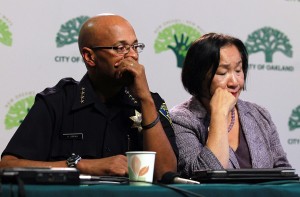The Oakland Police Department seemed to be specializing in chaos the last couple of weeks.

On May 3, a scathing report was issued by Thomas Frazier, the court-appointed overseer charged with ensuring that the department complies with long-delayed reforms stemming from a 10-year-old federal lawsuit. Five days later, the department’s consultant Bill Bratton was supposed to release his plan for improving OPD’s crime reduction efforts. Instead, Police Chief Howard Jordan retired. Two days after that, his interim replacement, Anthony Toribio, was himself replaced by Deputy Chief Sean Whent after Toribio stepped down, taking the much lower rank of captain. And when Bratton’s plan was finally released, it called out some significant shortcomings in the department — like there being only one part-time investigator assigned to 10,000 burglaries.
As if three chiefs in three days wasn’t enough, some observers say the person truly running the department is Frazier, the federal overseer whose main priority is not necessarily public safety but making sure that the department complies with constitutional policing procedures mandated by the reform agreement.
On yesterday’s Forum with Michael Krasny, Geoff Collins, a former member of Oakland’s Community Policing Advisory Board, voiced concerns about the competing priorities:
If there was any doubt in anyone’s mind last week, the week of the three chiefs should have ended it. Tom Frazier and Robert Warshaw [a court-appointed monitor] are in complete control of this department. And that’s fine … but is Tom Frazier accountable to the citizens of Oakland for public safety? We know he’s accountable to the judge for compliance. And I believe the concern in the community right now is when you have this rampant crime, you have this good plan put forward by Bratton and Wassserman … where will commissioner Frazier’s emphasis be? Will it be on the compliance issues? Will it be on supporting the Bratton plan?
Matthai Kuruvila, who has been covering the OPD for the San Francisco Chronicle, said that city officials and community advocates think that meeting federal reforms and public safety are not at odds. But he said that it’s the police officers themselves who need to be convinced of that:
“”If you talk to Oakland police officers, a number of them say they’re afraid to do some of these basic elements of policing because they’re afraid to get into the crosshairs of the compliance director. There’s clearly a lack of training and development of these officers — Bratton has identified it, Frazier has identified it — about how to do policing properly and not get in the crosshairs. What you’ve seen instead is arrests and stops going down.”